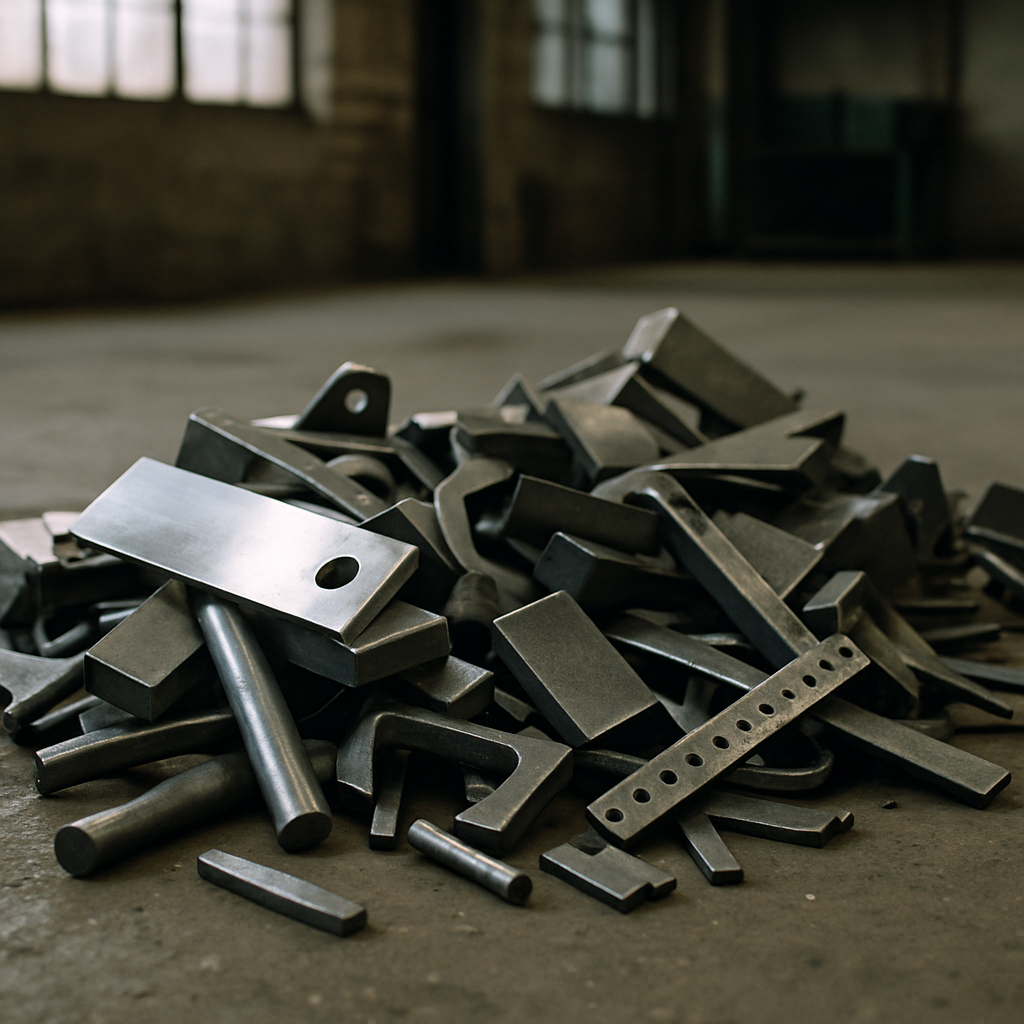5901 Botham Jean Blvd, Dallas, TX 75215
What is Scrap Metal Pickup for Large Businesses?
August 5, 2025In today’s resource-conscious business environment, scrap metal pickup services have become an essential solution for large enterprises generating metal waste. These specialized collection services enable businesses to efficiently dispose of unwanted metal materials while supporting sustainability goals. Companies no longer need to manage the complex logistics of metal disposal themselves.
Scrap metal pickup providers offer tailored solutions specifically designed for commercial needs. They handle everything from one-time cleanouts to regular scheduled collections, accommodating operations of any size. Services typically include container placement, transportation, sorting, and proper recycling of materials at certified facilities.
For businesses with ongoing metal waste generation, these services provide specialized containers that can be placed directly at production sites or waste collection points. These containers come in various sizes to accommodate different volumes and types of metal waste. Most service providers accept a wide range of metals including aluminum, copper, brass, steel, iron, and stainless steel – any metal material that has reached the end of its useful life in your operation.
How Do You Choose a Scrap Metal Pickup Service?

Selecting the right scrap metal pickup service requires careful consideration of several factors, as it affects your bottom line, operational efficiency, and environmental footprint. Your chosen provider should align with your business values and recycling goals.
When evaluating potential services, start by assessing their capability to handle your specific volume and types of materials. Different businesses generate varying amounts and kinds of scrap metal, and not all recyclers can efficiently process every type.
Evaluate Their Business Capabilities
Look for a service with the infrastructure to support your business needs, including adequate equipment, transportation, and processing facilities for your materials.
Container options are crucial for businesses with regular scrap generation. Many providers offer various sizes and configurations to fit different space requirements and material volumes. Some services provide specialized containers for separating metal types, which can increase the value of your scrap.
For larger operations, inquire about on-site services like demolition capabilities or equipment to process bulky materials, which can save time and resources in preparing scrap for recycling.
Verify Credentials and Experience
Work with licensed and insured recyclers. Legitimate operations have necessary permits and follow environmental regulations, protecting your business from liability issues.
Experience in your industry is valuable. Providers familiar with your business type understand your scrap generation patterns and may offer tailored solutions. Ask for references or check online reviews to gauge their reputation.
Insurance coverage is essential; the recycler should carry comprehensive liability insurance for accidents or damages during pickup or processing.
Compare Pricing and Payment Terms
Pricing structures vary among recyclers. Some offer a per-pound rate for mixed metals, while others provide detailed pricing for different types. Competitive services offer better rates for pre-sorted materials.
Ask about payment methods and timing. Some recyclers offer immediate payment, while others operate on a net-30 or other schedule. For regular scrap generation, look for providers offering systematic reporting for better tracking.
Be cautious of pricing that seems too good to be true, as it may indicate questionable practices or hidden fees.
Assess Environmental Practices
A responsible service should have transparent recycling processes prioritizing sustainability. Inquire about their recycling rates and the destination of collected materials.
The best providers have relationships with domestic metal processors and can trace where your materials end up. This information helps businesses track environmental impact or report on sustainability metrics.
Some recyclers also offer environmental impact reports quantifying the benefits of your recycling efforts, such as energy saved or emissions reduced, supporting sustainability initiatives and marketing efforts.
Consider Logistics and Reliability
Evaluate the pickup schedule and flexibility of potential providers. Can they accommodate your production schedule? Do they offer on-call service for unexpected large volumes?
Reliability is crucial, especially where scrap accumulation can interfere with operations. Check reviews or references to ensure consistent pickup schedules.
Geographic coverage matters. If your business has multiple locations, a recycler serving all facilities can streamline administration and improve pricing through volume discounts.
Evaluate Customer Service and Support
The quality of customer service significantly impacts your recycling experience. Look for providers assigning dedicated account representatives who understand your needs.
Good communication is essential, especially concerning schedule changes, market price fluctuations, or service issues. Top providers proactively inform you about factors affecting your scrap metal program.
Some recyclers offer additional support like training for staff on material separation or optimizing the scrap collection process. These value-added services can enhance the efficiency and profitability of your recycling program.
By carefully evaluating these factors, your business can select a scrap metal pickup service that provides fair compensation for your materials while supporting your operational needs and sustainability goals.
What Steps Are Involved in Scheduling a Pickup?
Scheduling a scrap metal pickup is simple when you know the process. The first step is to contact a recycling service provider to discuss your specific needs. Most reputable companies offer a free on-site estimate to assess the volume and type of materials you have for recycling.
During the assessment, the recycling specialist will evaluate your scrap metal inventory and provide a quote based on their pricing structure. Some companies base their rates on volume, while others calculate by weight. This initial consultation also allows you to ask questions about their recycling processes and environmental protocols.
Once terms are agreed upon, you can set up your preferred pickup arrangement. For businesses with consistent waste streams, a regular pickup schedule—such as weekly, bi-weekly, or monthly—makes sense based on your scrap metal generation. For one-time cleanouts or project-based needs, scheduling a single removal might be more appropriate.
Before finalizing the arrangement, ensure you fully understand the pricing structure. Ask about minimum weight requirements or additional fees for services like container rental or specialized handling of certain materials. Most reputable recyclers provide clear, transparent pricing without hidden charges.
Some recyclers may offer different container options based on your needs—from small collection bins for office settings to large roll-off containers for industrial applications. Choose what works best for your space and volume constraints.
When scheduling your pickup, request information about where to place materials for collection and whether you need to sort different metal types beforehand. This preparation ensures a smooth pickup process and maximizes the recycling value of your materials.
For commercial clients, many recycling companies can provide documentation of proper disposal, which may be needed for sustainability reporting or compliance requirements. Don’t hesitate to ask for these records if they’re relevant to your business operations.
How Can Businesses Prepare for Scrap Metal Pickup?

Proper preparation for scrap metal pickup is crucial for businesses aiming to maximize value and ensure a smooth collection process. Organizing materials before the recycling service arrives saves time, enhances safety, and often results in better returns. Here are essential steps businesses should take when preparing for scrap metal collection.
Segregate Different Types of Metals
Proper segregation is a critical step in preparing for scrap metal pickup. Separate ferrous metals (iron and steel) from non-ferrous metals (aluminum, copper, brass) to streamline processing and maximize value.
Sorting materials by type prevents cross-contamination and ensures you receive appropriate payment for higher-value metals. For instance, mixing copper with aluminum could result in payment based on the lower-value material, significantly reducing your potential returns.
Use clearly labeled containers for each metal type to maintain organization. This practice increases efficiency and demonstrates professionalism to your recycling partner.
Remove Non-Metal Components
Take time to remove obvious non-metal attachments from your scrap. Detach plastic handles from metal pots, rubber grips from tools, and any electronic components from appliances or equipment. This step significantly increases the value of your materials.
Contamination with non-metal materials can lead to processing complications and potential additional fees. Many recycling facilities follow the 50 percent rule—items must contain at least 50 percent metal to qualify as recyclable scrap, but cleaner materials always command better prices.
For larger items like equipment or machinery, consider disassembling them to separate valuable components and reduce bulk before pickup.
Ensure Safe Access to Collection Areas
Plan for safe and efficient collection by clearing pathways to your scrap metal storage areas. Remove obstacles that might impede access for the pickup team and their equipment. This preparation prevents delays and reduces safety hazards.
If your scrap is stored in a specific location within your facility, ensure that doors, gates, and other access points are unlocked and accessible during the scheduled pickup time. Clear communication about location details helps drivers navigate to the correct area without confusion.
Consider weather conditions when scheduling pickups, as rain or snow can create additional challenges for safe material handling.
Follow Proper Loading Guidelines
If your recycling service provides containers, adhere to their specific loading instructions. Respect weight limits to prevent damage to containers and ensure safe handling. Overloaded containers present serious safety risks and may result in collection refusal.
Distribute weight evenly throughout containers to maintain stability during transport. For loose materials, consider using sturdy boxes or bins that facilitate easy transfer to the recycler’s vehicle.
If you have extremely heavy items, communicate this in advance so the pickup team can bring appropriate equipment to handle the load safely.
Prepare Required Documentation
Many states require identification and documentation when recycling certain types of scrap metal, particularly for high-value materials like copper. Have necessary paperwork ready to streamline the transaction process.
Keep records of your recycling activities for inventory management and sustainability reporting. Proper documentation also helps maintain compliance with regulations governing scrap metal handling in your area.
Businesses should also maintain a log of materials they recycle regularly, which helps track values over time and optimize recycling efforts.
Implement Proper Safety Measures
Prioritize safety when handling scrap metal before pickup. Ensure staff wears appropriate personal protective equipment, including heavy-duty gloves, safety goggles, and sturdy footwear, to prevent injuries from sharp edges or heavy items.
Be cautious of potentially hazardous materials that might be found in scrap, such as lead, mercury, or cadmium. These substances require special handling procedures and should be identified before collection.
If your business regularly handles significant volumes of scrap metal, consider implementing formal safety protocols and training for employees involved in the process.
By following these preparation steps, businesses can create an efficient scrap metal recycling program that maximizes returns while maintaining safety and environmental responsibility. Proper preparation not only improves your recycling outcomes but also builds a stronger relationship with your recycling service provider.
| Preparation Activity | Details |
|---|---|
| Segregate Different Types of Metals | Separate ferrous metals (iron, steel) from non-ferrous metals (aluminum, copper, brass) to streamline processing and maximize value. |
| Remove Non-Metal Components | Detach plastic handles, rubber grips from tools, and any electronic components from appliances or equipment. |
| Ensure Safe Access to Collection Areas | Clear pathways to scrap metal storage areas to prevent delays and reduce safety hazards. |
| Follow Proper Loading Guidelines | Adhere to loading instructions from recycling services, respect weight limits, and distribute weight evenly. |
| Prepare Required Documentation | Have necessary paperwork and records of recycling activities ready, especially for high-value materials. |
| Implement Proper Safety Measures | Ensure staff wears appropriate protective equipment and identify hazardous materials like lead or mercury. |
Conclusion: Maximizing the Benefits of Scrap Metal Pickup Services

Professional scrap metal pickup services provide an effective solution for businesses facing waste management challenges. These services alleviate the logistical burden of handling heavy and potentially hazardous materials while ensuring proper recycling. Companies that regularly use scrap metal pickup benefit from cleaner workspaces, reduced safety hazards, and streamlined compliance with environmental regulations. An effective service provider will help you organize materials more efficiently, lessening the need for frequent pickups and optimizing your waste management process overall.
In addition to operational benefits, professional scrap metal recycling plays a crucial role in meeting sustainability objectives. By ensuring metals are properly sorted, processed, and reintroduced into manufacturing, your business aids in conserving natural resources and minimizing environmental impacts. To maximize the benefits of your scrap metal program, regularly evaluate your current practices and consider collaborating with a provider that offers certification of proper disposal. For expert advice on implementing an effective scrap metal management program for your business, contact Okon Recycling at 214-717-4083.
